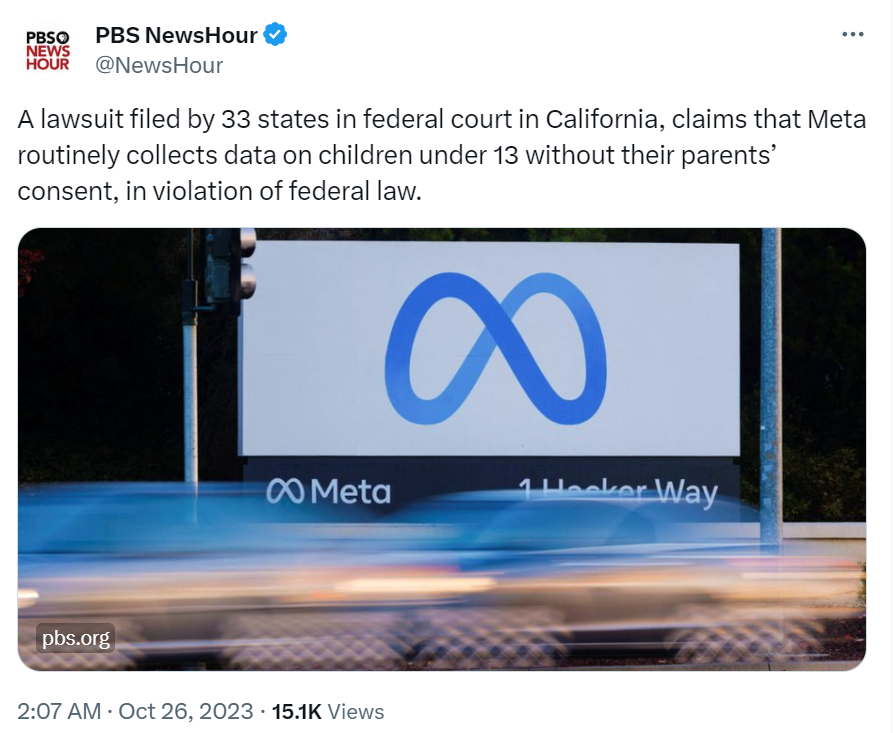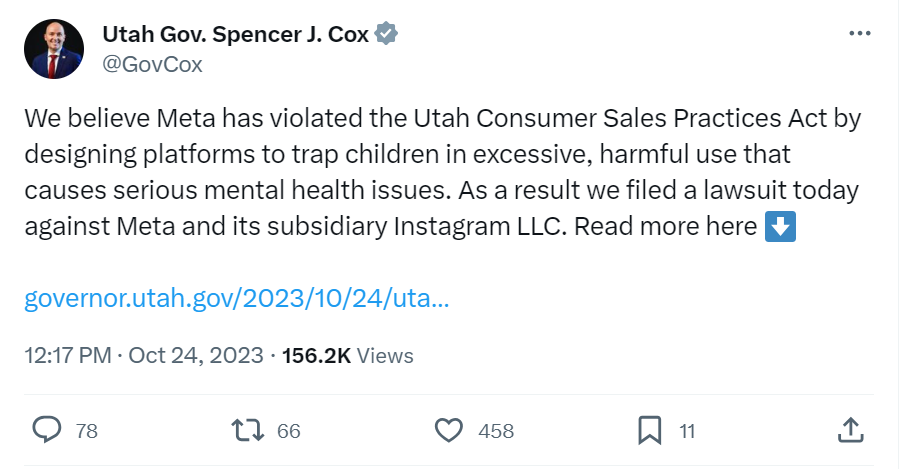Earlier this week, dozens of US states launched a lawsuit against Meta Platforms and its Instagram property, accusing the company of fueling a youth mental health crisis with its “addictive” social media platforms.[1]
The complaint was filed on Tuesday involving the attorneys general of 33 states, including California and New York. They allege that Meta, the company that operates Facebook, Instagram, and WhatsApp, repeatedly misled the public about the dangers of its platforms – even going as far as to induce young children and teenagers into compulsive and addictive social media use.[2]
According to the complaint filed in Oakland, California federal court, “Meta has harnessed powerful and unprecedented technologies to entice, engage, and ultimately ensnare youth and teens. Its motive is profit.”

Source: X
Growing Legal Battles
The Meta lawsuit is the latest in a string of legal actions against social media companies with regards to their effect on children and teens. Meta already has lawsuits, and TikTok and Google’s YouTube have hundreds of lawsuits filed on behalf of children and school districts over social media addictiveness.
Much of the focus on Meta stemmed from a whistleblower’s release of documents in 2021 that showed the company knew that Instagram, which is primarily an image-sharing app, worsened body image issues for teen girls.
States also accused Meta of violating a law banning the collection of data of children under the age of 13 and continually denied that social media was harmful. The company did not disclose that the algorithms were designed to capitalize on young users’ dopamine responses and create an addictive cycle of engagement.[3]
In this complaint, Meta refused to accept responsibility for a 14-year-old girl’s suicide in the UK, which was believed to be caused by her exposure to suicide and self-injury on Instagram.[4] The coroner rejected Meta’s claim that this content was “safe” for children. The girl had binged harmful content that normalized the depression she felt before taking her own life.
Meta responded to the lawsuit by saying that it taken many steps to support families and teenagers. “We’re disappointed that instead of working productively with companies across the industry to create clear, age-appropriate standards for the many apps teens use, the attorneys general have chosen this path,” the company said in a statement.
Eight other US states and Washington D.C. are filing similar lawsuits against Meta on Tuesday, bringing the total number of authorities taking action against the company to 42.

Source: X
Meta could face civil penalties of $1,000 to $50,000 for each violation of state laws, which can grow significantly as the lawsuit unfolds.
Is Social Media Addictive?
The lawsuit and accusations against Meta are raising deeper questions about social media use, especially among younger demographics. These concerns have already been posed by mental health professionals, but they’re only growing.
Experts who study internet use say that social media has a magnetic allure because of how content plays to our neurological impulses and wiring. Consumers find it hard to turn away from the incoming stream of information.
According to David Greenfield, a psychologist and founder of the Center for Internet and Technology Addiction in West Hartford, CT, these devices lure users with some powerful tactics, including intermittent reinforcement.[5] This creates the idea that a user could get a reward at any time, but the timing is unpredictable.
He draws comparisons between social media use and slot machines. Users are beckoned with lights and sounds for that unpredictable hit that rewards their efforts. But with social media, the reward is tailored to the user’s interest and tastes – a reward that’s much more powerful.
Adults are susceptible to this addictive nature of social media, but young people are at a greater risk. The brain regions that are involved in resisting temptation and reward are not nearly as developed in children and teenagers as they are in adults. They have undeveloped impulse control, which social media capitalizes on.
The adolescent brain is also attuned to social connections and social media is designed to facilitate connections.
For years, the scientific community typically defined addiction in terms of literal addictive substances, such as drugs and alcohol, not behaviors like gambling, sex, and internet use. That has gradually changed. As of 2013, the Diagnostic and Statistical Manual of Mental Disorders (DSM), the official reference for mental health conditions, behavioral addictions or compulsions have the same criteria as substance addictions, but more research is needed because of broad interpretations.
According to Dr. Michael Rich, the director of the Digital Wellness Lab at Boston Children’s Hospital, the word “addiction” in relation to the internet should be discouraged. Instead, he prefers the term “problematic internet media use.”[6] The internet has valuable uses, so casting too wide a net can create problems, but there are issues with excessive internet use that interferes with school, sleep, or daily functions – the classic signs of other addictions.
Children have been an appealing demographic for businesses. Tobacco companies, gaming companies, and other businesses have long been trying to “hook” children at young ages, when they’re most impressionable, and encourage brand loyalty. For Meta and other social media companies, gaining younger consumers may secure more advertising revenue with the hopes of children purchasing products when they grow up.
However, the states said research has associated the use of social media platforms – particularly Meta, with depression, anxiety, insomnia, interference with education and daily life, and other negative outcomes.
The Changing Landscape of Social Media
The growing lawsuits against social media companies on behalf of children and young adults seem to be a solution to patch holes left by Congress’ unwillingness to pass new online protections for children, despite years of discussions and public outcry for a federal solution.
Sources:
[5] https://www.nytimes.com/2023/10/25/health/social-media-addiction.html
[6] https://www.nytimes.com/2023/10/25/health/social-media-addiction.html



